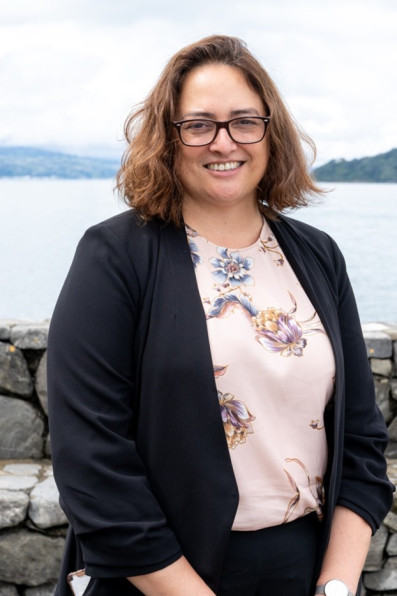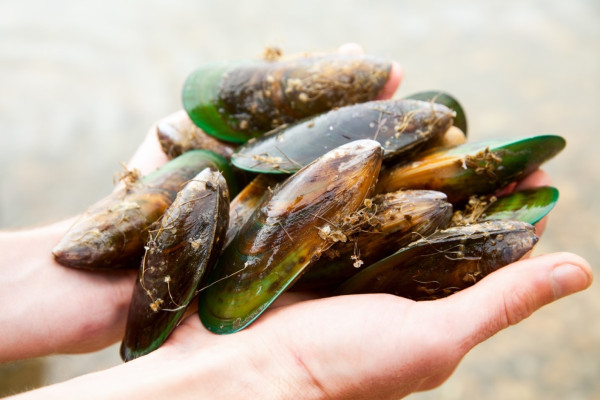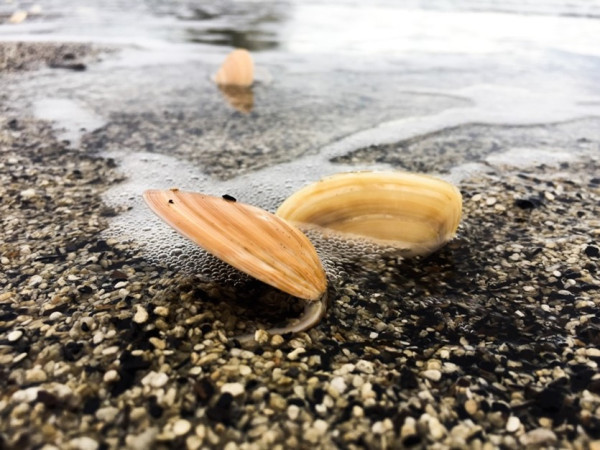Posted on 25 July 2023
Te Au o Te Moana - Voice of the Ocean: Karen Fisher
- News
- 15 Minutes to read
Karen is a human geographer and Associate Professor in the School of Environment at the University of Auckland. She researches how knowledge is produced and used to inform environmental governance and management in New Zealand. Her work is focused on transdisciplinary approaches to understanding marine social-ecological systems; accommodating different conceptualisations of, and knowledge about, rivers and river management; and the potential for indigenous knowledge to enable just and sustainable river futures.
Published July 2023
Interview by Desna Whaanga-Schollum
….
Karen Fisher toku ingoa,
ko Ngāti Maniapoto me Waikato Tainui oku iwi
I do have a moana that I whakapapa to. I don't know that pepeha as well, but I tend to refer to my Maniapoto ancestry often because that's where my mum grew up. But I’m also from Tahāroa on the West Coast of the North Island, and though I haven't spent time there, my family and I are very proud to have that whakapapa connection to that part of the moana.

I remember going there as a child and it was wild, and even as an adult, it's wild. As a child, I was fascinated by the iron sand, and whenever we went to visit whānau, we would get more iron sand and bring the sand home and play with the magnets and things like that. We probably shouldn't have been doing that!
It was interesting because I think for my mum, she liked the East Coast because it was easier to get kaimoana than the West Coast, as a child she grew up going to the West Coast. But she went down to near Mokau, so less around Tahāroa, but a bit further south. For us as kids, I think it was wild, and the weather, it was just as wild. The West Coast is wild and beautiful.
I do remember going there once as an adult with a friend. I took her out there and someone came up to us asking, you know, ‘Who are you? What are you doing here?’ I was like‚ ‘Oh, I’m a .’, and they said “Oh you’re fine!” It was years ago, but it was one of those days, just a perfect day, the moana was amazing. It was really special.
Photo: NIWA/Lana Young
Can you tell us a little bit about yourself and why are you involved with the Challenge?
Well, I’m an Associate Professor in the School of Environment, at the University of Auckland, and I've been involved with Sustainable Seas since 2015 — as a project leader in Phase One and now I'm a theme leader. The theme I'm leading is called Enhancing ecosystem-based management (EBM) practices‚ and four projects sit under that, focused on policy, governance, and institutional factors and practices to encourage the uptake of EBM more broadly in Aotearoa.
I'm interested in the human environment, relationships, and interactions. In terms of the Challenge, that manifests as an interest in policy and governance. How do we regulate space? How do we regulate people and activities in and around the moana?
How do you feel connected to the moana?
It's from childhood. That's where the connection to the moana really comes from for me. I loved to swim as a child, and I loved when we went to the beach. We grew up on a farm, but we would always go to the East Coast beaches around Coromandel.
The other reason I feel connected to the moana is because of my mother, who was Māori.
Whenever we went to the beach, she didn't really see any point unless you were going to get kaimoana. We were always getting kaimoana. We would go to Waihi beach to get pipi and we would come up the other side of the Coromandel to get mussels. When me and my siblings were growing up, the beach, the moana, was always a part of our lives.
I don't eat kaimoana, but I have such fond memories of collecting kaimoana. I used to love collecting it with Mum and my family and I used to come home with these big sacks of mussels and I would shell them. I liked the idea of kaimoana, but I didn't like to eat it.

We also learned about Tangaroa...
The moana and Tangaroa was inseparable for me, and we were raised to respect and revere the moana and Tangaroa. My mum is not with us now, and I would love to have the opportunity to ask her about some of the things that she taught us when we were growing up. You learn through your mum's cultural knowledge or mātauranga. I just grew up with this deep respect and reverence of Tangaroa that I took for granted.
Mum would say things like, ‘Never turn your back on the ocean’, which was a sign of disrespect. But also it makes perfect sense because waves could knock you down. And, you know, ‘Throw the first one back’, and all these other things, and how if you eat food in front of Tangaroa, you're eating his children in front of him, and being respectful and that sort of thing, which for me didn't matter because I didn't eat them but it was that connection between the moana and Tangaroa.
I've always found a sense of calm and peace with the moana, but I respect it greatly. I know that you have to respect the moana, you have to respect Tangaroa, and if you don't, then that's foolish.
It’s at a more instinctual level rather than an academic level, I would say. I had all that fondness for the moana, but I guess I connected it to food and family, especially when I was young. It's personal and your identity. I don't think the moana is special because of any science reason. Not at all. It's our relationship with it. My connection is definitely at an emotional and personal level. It's not in an intellectual level or anything like that.
Is there a memory that really stands out for you where you felt connected to the moana?
I do think of my childhood. I feel connected to the moana and I liked to get kaimoana, but I also complained as well because as a kid who was good at swimming, I used to get annoyed that we'd always go to the beach at low tide, you know, so we could get food. Or because the mussels grow on rocks, my feet would get sore. Or if we were going to the beach, I'd have to look after my little sister (I now realise it's because I was a strong swimmer).
I remember one time being with some people and just feeling really, really overwhelmed, and we were at the Mount and I just basically ran out of the house. I was 16 years old and I felt so overwhelmed I ran out of the house, and just sat at the beach, watching the ocean until I calmed down. A friend came to join me and I didn't even notice he was there for a few minutes because it was just like there were too many people; there was too much happening. But I knew I'd feel better if I went out and just watched it [the ocean], just sat. And that's what I mean by the calming. It's rhythmic. It's more than us. But it connects us, and we connect to it in different ways. Very healing, but on a sort of a psychological level. I guess also at a physical level. It all connects doesn't it. It has that influence on your energy.
What motivates you to work for better moana management?
At some point in my life, I became disconnected from the moana because you grow up and maybe you get busy doing things. And you go to Uni and you think you're clever, and so for me, especially being with Sustainable Seas, it's coming back to the moana.
But in terms of what motivates me to work for betterment moana management, I don't know if I would have separated better moana management from better environmental management. I focus on freshwater, but I've been doing a lot of marine work, and they're not disconnected. I think we tend to sort of compartmentalise, but I don't know that I ever really thought of anything in isolation, if that makes sense. I'd say my motivation is about thinking more broadly about the environment.
As a little kid that grew up collecting kaimoana on the Coromandel, when I got older there were periods where there just weren't the kaimoana available. That to me was really distressing and confronting because I thought, ‘how did we get to this’? How is it that we're in this place where my mum getting some pipi became a bit of a treat rather than something that we used to do?
I remember one of the first times she bought mussels, and thinking how she was buying mussels because she couldn't collect them anymore. But she loved mussels, so the desire of the mussels outweighed not having them. I guess I became aware, but I didn't really know what was causing it, and I certainly didn’t know how to intervene. Again, really whānau-centric [motivation].
I love the word moana. I remember even as a kid, I liked the mouthfeel of ‘moana’. I think it's one of the most beautiful Māori words. I love it. It conjures up for me an image of the moana, but actually Moana takes different forms, in different parts of the country, and in different parts of the world. It’s such a beautiful word to say.
Because I don’t eat kaimoana, there's this kind of weird disconnect between me and my relationship with the moana, because I think that gathering food really does intimately connect you to the environment.
So I'm like everybody else who just goes for a swim. But knowing how to read the tides or checking the tides and knowing where and how to find pipi as a five-year-old — I wouldn't know how to do it now if mum hadn’t taught me. It's a matter of remembering for me and I'm remembering a lot more about things that you forget because of going to school, going to university, and things like that.
I remember a few years ago a colleague and I were giving a conference presentation. It was to do with Sustainable Seas work, and I remembered that we had a carving of Te Ika-a-Māui that had been done for us, and I remembered that that was the first way I learned about New Zealand because it was from a carving on a wall.
I’d forgotten because I had gone to school, and I had gone to university. From a young age my understanding of New Zealand or the North Island was that it was fished up by Māui because it was on a carving on our loungeroom wall. And then you go to school and you learn about geology and tectonic plates and all that kind of thing.
So I guess it's a process of remembering — that I've been more conscious of in the last ten or so years. But there's decades of forgetting. [It’s about] turning back to your taiao.
How would you describe the current state of the moana in Aotearoa?
It needs help. We all say that we love it and then I don't know that we necessarily think about what we're doing to protect it or to prevent it from being further degraded. We all say that we want it in a good state. But what are we actually doing?
At the same time we're all using it, some of us are abusing it. There are so many activities occurring on land and in the water that are having a detrimental impact on the moana. I guess people need to put their money where their mouths are — maybe not the money — they need to walk the talk if you actually care about it.
No one's perfect. I'm not perfect, but I guess we could be. I think we've taken the moana for granted, and maybe that's one of the things that I grew up knowing from my mum is, don't take it for granted. [We think] it doesn't get hurt but it does.
What's the biggest challenge that you see in marine management?
It’s people. I guess from my research perspective and, given my focus is on people and people's interactions with the environment, I'd say it's…
how can we actually regulate activities or how can we regulate people's behaviour in relation to the marine environment?
That might be on land, or it might be in water. It's not a way of trying to control people or tell people what they can't do, but it’s a way of protecting that ongoing relationship. I think we tend to be a bit short sighted, in some respects. If we want to continue to have an environment that we can all benefit from, then we need to think longer term. And in terms of who has responsibility. I think individuals probably have some responsibilities. And also what we might hope to have, is governing arrangements - that might be the state, it might be iwi - which are able to regulate what is happening at local levels and then building from there.
I mean, I don't even remember learning about rāhui, but I knew about rāhui in relation to coastal areas as a little kid. So, you know, it could be things like a rāhui — it can be rules and plans.
There's a lot of different things that I think are needed. This is challenging because it’s such a complex space and challenging because there are so many competing interests and claims to it and everyone feels they have a claim. It’s complex.

Photo: Desna Whaanga-Schollum
To be respectful, is one thing that every person can do that supports my work at Sustainable Seas.
My work is supporting other people who are doing the research. The researchers in my theme are identifying actions to support the moana and those actions, given the nature of the research, they relate to governance, or they relate to policy.
Because of the project, the theme is really about ecosystem-based management practices and the project is calling for changes in governance and changes in how things are done. And the researchers are looking at national government as well as local government, as well as iwi, as well as hapū.
One action that New Zealanders could do is to say to national governments and to regional governments and to their hapū or iwi or whānau, ‘this is what we need to do. We need to put the moana first’. It's a two-way street. New Zealanders can make noise, they can draw attention, and the Challenge can help to raise awareness, can help to advocate on their behalf by doing research that supports their interests and raises matters in different forums. The research is there to amplify voices, including of the moana, so that there are better ways of managing the moana.
I think New Zealanders are taking action, so my research has to amplify their voices and do something with their efforts. They are doing it and they're doing it in different way. So really, that's where the research, I hope, would actually support their action, not the other way around.
What I would say, as a researcher coming to understanding the moana, there are different ways that we can understand the moana and we can understand it through all sorts of technical, scientific ways. We can understand it through, in my case, ideas around place and ideas around human environment relations. We can understand it through law, we can understand it through governance, we can understand it in so many ways when we come to do research on the moana.
In some respects anyone can do research on the moana — poets, writers, painters. This is important in terms of understanding the moana, and in communicating why it's important and why it's special. Communicating the relationships that we have with it and maybe demystifying it, while at the same time maintaining that magical element of the moana.
There are so many ways that you can come to work with or know the moana. Thinking about rangatahi and what they might want to do, if they are motivated by their own personal passions, then there's so many ways that it can be approached.
I think having diverse ways of understanding that relationship, of understanding the interconnections between people and moana, and the more, ki uta ki tai way of understanding things is invaluable. Because it can help us to think about how we might do a better job of living with the moana.